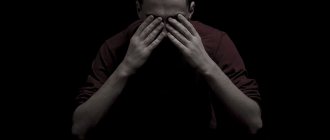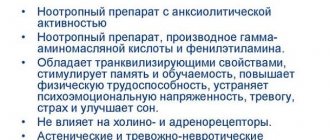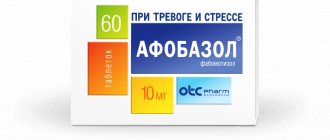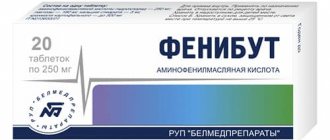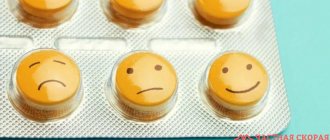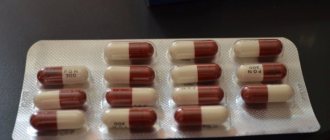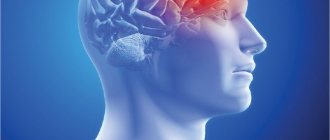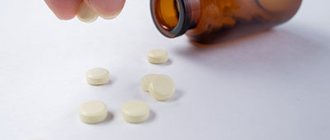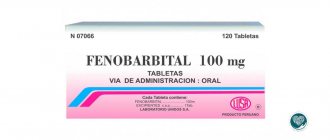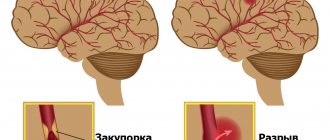Modern people are susceptible to stress and depression, fatigue and anxiety. A person exhausted by stress is unable to maintain the desired rhythm of life and work effectively.
Recently, nootropic drugs have become widespread, that is, drugs that normalize the state of the central nervous system and affect higher mental functions. Taking such drugs improves sleep, helps cope with stress, and increases mental performance.
Description of drugs
Anvifen and Phenibut are medications that have both nootropic and sedative effects. The main active substance of these medicines is aminophenylbutyric acid. Does it turn out to be the same thing? To find out what the difference is, let's take a closer look at each of them.
Anvifen
It has a sedative and anti-anxiety effect, resulting in improved memory performance, increased concentration and performance, normalized blood circulation in the brain and oxygen saturation of cells. Anvifen is prescribed:
- In states of anxiety, constant fear or worry, excessive irritability;
- For the treatment of neuroses;
- To improve sleep quality;
- To relieve neurotic problems during alcohol withdrawal;
- To prevent dizziness and motion sickness;
- In pediatrics to get rid of hyperactive behavior, stuttering, enuresis, nervous tics.
Phenibut
It is also an anti-anxiety and nootropic agent. It is prescribed in the same cases and has the same therapeutic effect as Anvifen.
Phenibut and Anvifen equally influence the functionality of the body and have the same therapeutic properties.
Anvifen and Phenibut do not differ in pharmacological properties; they are complete analogues and generics. Both are nootropics that have a positive effect on brain function, improving blood circulation, memory, attention, concentration, and performance. They also have an anti-anxiety effect - relieve symptoms of anxiety, fear, neuroses, increase initiative, mood, and normalize sleep.
Indications for the use of nootropics
Neurologists prescribe drugs of the nootropic class to treat diseases such as:
- Vegetovascular dystonia.
- Migraines and dizziness.
- Obsessive-compulsive neuroses and anxiety disorders.
- Sleep disorders and attention deficit disorder in children.
- Lesions of the central nervous system, such as ischemia, encephalopathy, myoclonus.
- Withdrawal syndrome and intoxication.
- Neurogenic disturbance of diuresis.
- Asthenic syndrome.
- Meniere's disease.
- Dementia and oligophrenia of various etiologies.
Often these medications are also recommended for children to take when preparing for school or at the end of the school year. At this time, the child's brain needs enhanced protection.
The most common nootropic drugs are Anvifen and Phenibut.
Application
Using these drugs:
- Circulation and tone in the vessels of the brain are optimized.
- Anxiety, overexcitability, and excitement go away.
- Functionality increases and learning becomes easier.
- The transmission of impulses to the central nervous system increases.
Both drugs have the same contraindications, such as:
- Pregnancy;
- Lactation period;
- Individual intolerance to substances.
The side effects are also the same. Against the background of improper medication use and overdose, symptoms such as:
- Drowsiness;
- Nausea or vomiting;
- Allergic reactions.
Comparison of Phenibut and Anvifen
Since the active ingredient of both nootropics is aminophenylbutyric acid, the mechanism of their effect on the body is the same . Preparations based on this substance stabilize the functional state of the central nervous system by normalizing the metabolism of its tissues.
With their help:
- Microcirculation in the vessels of the brain improves and vascular tone increases.
- Anxiety, excitability and emotional stress are reduced.
- Increases performance and improves the learning process.
- Cell membranes are strengthened.
- The transmission of impulses in the central nervous system accelerates.
- The processes of excitation and inhibition are regulated.
The main part of both drugs is broken down by the liver, so they should be prescribed with caution for diseases of the liver and gastrointestinal tract. It is also not recommended to take the medicine during pregnancy and lactation, for children under 3 years of age, and for any forms of allergies.
Both medications should not be used when engaging in activities that require increased concentration or when operating complex or dangerous machinery.
Neurologists claim that both drugs are equally effective, since they are analogues of each other. In this case, it is important to pay attention to the country of origin of Phenibut: patients agree that Phenibut produced in Latvia or Belarus is preferable to domestic ones.
Both nootropics should be taken after meals, and the course of treatment with both drugs is approximately the same - 30-45 days.
Side effects of Anvifen and Phenibut are common and include:
- Allergic manifestations on the skin: itching, rash.
- CNS reactions: dizziness, headache, lethargy and drowsiness.
- Manifestations from the gastrointestinal tract: dyspepsia, nausea.
In general, both products are considered non-toxic and safe for patients.
Course and dosage
The instructions for use of Anfiven and Phenibut indicate identical dosages of use and course of treatment, since these are analogues, there are no differences. Most often, the course of use of the drug is 2-3 weeks, but can be increased to 6-8 weeks. The drugs are taken three times a day. Adults and children over 14 years of age are prescribed 250-500 mg per dose, children over 8 years old - 250 mg, children over 3 years old - 50-100 mg per dose.
It is recommended to take these medications before meals.
Content:
- Is Phenibut a drug?
- Why Phenibut Can Work Like a Drug
- Hallucinations from nootropic development
- Phenibut overdose - consequences
- Compatibility of Phenibut with drugs
- What happens if you combine Phenibut with drugs?
- Phenibut addiction treatment
The medical drug Phenibut was created in 1975.
Since then, it has been actively used in medicine to eliminate various pathological conditions: nervous tics, stuttering, insomnia, dizziness, and high levels of anxiety. It is often prescribed to drug addicts and alcoholics to improve brain activity. Not everyone knows that the consequences of taking Phenibut can be negative for the patient. With prolonged and uncontrolled use of the drug, you may encounter a withdrawal syndrome reminiscent of drug withdrawal.
Differences
Despite the above similarities, the drugs are not identical. Let's look at how the means differ.
- Release form. Anvifen is produced in the form of capsules, and Phenibut is produced in different forms - capsules, tablets, powder.
- Dosage of one capsule. Phenibut is mainly available in 250 mg doses. Anvifen has a wider choice - 25, 50, 125, 250 mg. If the drug is prescribed in doses less than 250 mg, administration is more convenient, since there is no need to divide the tablet.
- Production. The drugs are produced by different manufacturers. Anvifen is produced in Russia, and Phenibut in Russia, Belarus, Latvia, and the USA. Products produced in Latvia and the USA are of higher quality, since they pay more attention to quality control of the raw materials used and compliance with the standards of each production process.
- Price. Depends on production and dosage. Prices for drugs from Russian manufacturers Phenibut and its analogue in the same dose are different, the price of the second is higher.
- Time-tested. Phenibut has been produced for quite a long time, it has managed to prove itself over the years of medical practice, Anvifen is relatively new, but at the same time it is a modern drug of a new generation.
The differences between the products are not significant, so it is possible to consider them generics or analogues.
Phenibut
The drug Phenibut is most often produced in the form of tablets, less often in the form of a powder for the preparation of a solution or capsules. The active substance of the drug is aminophenylbutyric acid .
Pharmachologic effect:
- Psychostimulant.
- Tranquilizing or anxiolytic.
- Antioxidant.
- Antiplatelet.
When interacting with analgesics, antipsychotic and anticonvulsant drugs, Phenibut prolongs their effect and enhances it, but these drugs cannot be combined without the recommendation of the attending physician.
As a result of taking Phenibut, patients improve memory and attention, stabilize their emotional state and normalize cerebral circulation. In children, the drug helps treat stuttering, nervous tics, enuresis and hyperactivity.
Reviews
Here are reviews from doctors who use these drugs in their practice and from patients taking them:
- “I use Anvifen in treatment because of its more convenient form and dosage for children.”
- “I prefer to prescribe Anvifen, as it is a more modern drug; in my practice, it causes less side effects.”
- “The actions of the drugs are no different; I choose the prescription based on ease of administration, depending on the required dosage.”
- “After the introduction of Anvifen, I switched to a more convenient dosage form.”
- “I have been prescribing Phenibut to elderly patients for a long time to normalize sleep and prevent memory loss, the drug successfully copes with the tasks” (gerontologist).
- “Anvifen has a wider range of dosages, so it is convenient to use, the effects of the drugs are identical” (neurologist).
- “I have been taking Phenibut in courses for a long time, it helps me greatly to increase concentration, attention, memory, and at the same time my performance does not decrease while taking the course.”
- “I take Phenibut and notice improved memory and sleep” (patient).
- “I like Anvifen, it’s conveniently divided into capsule doses, it helped solve my problems.”
- “I had constant anxiety and irritability, the doctor prescribed me Anfiven, and I very quickly noticed an improvement in my condition.”
- “Phenibut helped me in treating motion sickness; after using it, traveling was no longer a torment.”
- “I’ve been taking Phenibut courses for a long time, it helps me keep myself in fighting condition, quickly restore strength, and sleep well” (athlete).
In reviews and comparisons of these medications, users note the convenience of taking Anvifen, especially when prescribed in low dosages. Others prefer to use Phenibut as a time-tested remedy. In terms of treatment effectiveness, both drugs are effective and work equally.
It is impossible to determine which drug is better, more effective. The only advantage of Anvifen is its ease of administration and variety of dosages. In cases where the dosages are non-standard, for children, it is best to choose it. In other cases, they can be replaced with each other. This will not affect the course of the treatment process.
Anvifen
Anvifen is a new generation medicine and is available in the form of gelatin capsules. Contains aminophenylbutyric acid hydrochloride powder inside.
Pharmachologic effect:
- Tranquilizing.
- Antioxidant.
- Antiplatelet.
- Anticonvulsant.
After a course of taking Anvifen, there is an increase in endurance, an improvement in the psycho-emotional state, and an increase in the accuracy and speed of reactions. Pediatric neurologists advise using this medicine as an effective remedy for developmental delays and to improve academic performance.
Is Phenibut a drug?
Despite the possible negative effects of Phenibut, it is not a drug.
But if taken for six weeks or longer, the drug leads to the formation of withdrawal syndrome. This means that if a person stops taking the pills, they will develop a painful condition. For this reason, doctors prohibit patients from independently increasing the daily dose of medication or extending the nootropic course. To prevent Phenibut from turning into a drug, you must follow the following rules:
- take the drug strictly as prescribed by the doctor;
- use tablets for no longer than three weeks;
- do not drink more than 500-1500 mg per day;
- discontinue the nootropic gradually, over a period of about two weeks, slowly reducing the daily dosage (gradually bringing it up to 20 mg per day).
